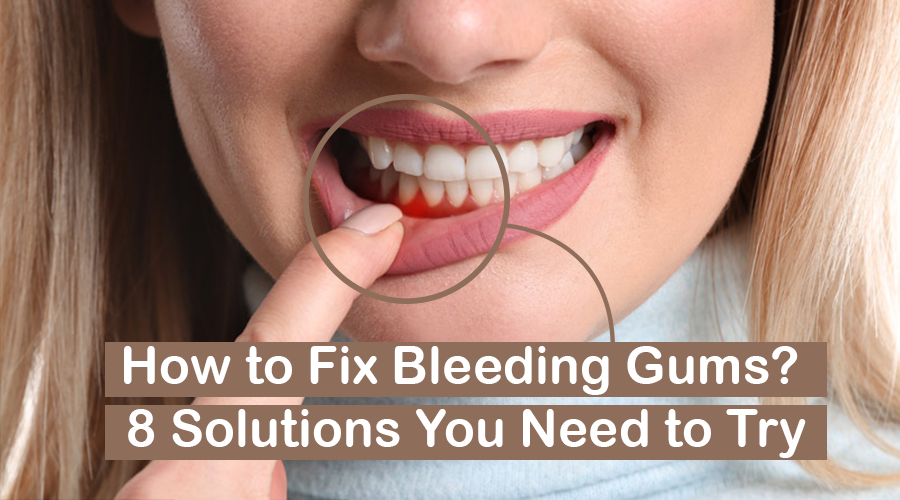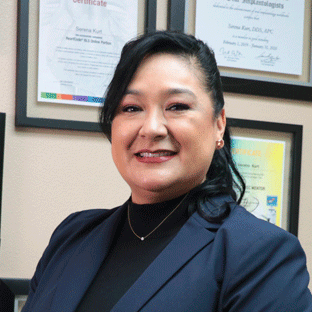How to fix bleeding gums is one of the most asked topics. Today we are finally jumping into it. Stay to learn a little more about the solutions that may help you with this issue.
Do you brush your teeth and notice the toothpaste has blood in it?
Or maybe you bleed in between your teeth every time you floss?
If, by any chance, your answer was yes to either of these questions, then it might be time to visit your San Diego dentist for some guidance.
Bleeding gums are pretty common, and although it’s not a reason to be alarmed, you should definitely pay attention to it because it can be an indicator of something bigger.
Although a small amount of blood might not sound like a big deal, you shouldn’t overlook it if your gums are often bleeding. If your gums are bleeding, here’s what you should do:
1- Improve Your Oral Health
Plaque accumulation along the gum line is the most common cause of bleeding gums.
When you don’t remove plaque with a dental cleaning, it hardens into tartar, a calcified substance to which plaque adheres and irritates the gums.
Gum bleeds result from this inflammation, which may lead to more advanced types of gum disease.
Increasing your oral hygiene routine is the best way to reduce plaque accumulation and the chance of bleeding gums.
At least brush your teeth twice a day or after every meal with fluoride toothpaste and floss once a day.
2- Pay Attention to Your Toothbrush
Your oral hygiene tools may be causing your gums to bleed. While it might seem that a toothbrush with medium or firm bristles cleans your teeth easier, more rigid bristles are more likely to irritate your gums, causing bleeding.
The American Dental Association (ADA) suggests brushing with a soft-bristled toothbrush to properly clean your teeth and gums and avoid discomfort.
Bleeding gums can also occur only occasionally rather than every day by flossing. Remember to flow every day and not push the floss over your gums too close.
3- Eat a Well-Balanced Diet
You are what you eat, and of course, your alimentation will affect the well-being of your gums.
Sugar provides a perfect atmosphere for plaque, so foods high in sugar or simple carbohydrates raise the risk of tooth and gum problems.
Your gums get the nutrients they need from a diet rich in whole foods like vegetables and fruits.
It doesn’t mean that you have to give up sweets altogether, but you can eat them in moderation and brush afterward to ensure that the sugar doesn’t stick around.
4- Take Into Account Your Medication
Certain medications can also make the gums bleed more often. Over-the-counter pain relievers can thin the blood and cause bleeding.
Some prescription drugs may also cause gum bleeding.
If this is the case for you, your doctor can recommend a different dosage or a different medication. And remember to discuss the secondary effects of medications with your doctor.
6- Give Up Smoking
Smoking is an essential part of the development of gum disease and increases the risk of certain cancers and heart disease.
Toxins in cigarette smoke prevent the gums from receiving the nutrients they need, which may result in inflammation.
It can be very hard to quit smoking, but it is one of the best changes you can implement for your oral and overall health.
5- Release Stress
Stress may have an effect on your oral health. When you’re tired, you’re more likely to forget brushing and flossing or prefer fast food over a healthy meal.
Stress causes the body to swell, making your gums more likely to bleed.
Having too much tension limits the functionality of your immune system, making it more difficult for your body to combat infection.
You can try to concentrate on stress-relieving strategies such as deep breathing and meditation.
7- Don’t Share
Gum disease and bleeding gums can be spread from person to person. Gingivitis-causing bacteria may be passed between partners or parents and children.
To be clear, it’s best to avoid sharing toothbrushes, dirty silverware, and water glasses.
8- Visit a San Diego Dentist
The next step is to see a San Diego dentist if these changes don’t stop your gum bleeding.
Dr. Serena Kurt is an experienced San Diego dentist that will look at your teeth and gums to see if you have a more severe problem, like advanced gum disease.
Serena Family & Cosmetic Dentistry specializes in advanced restorative dentistry. Dr. Serena Kurt is the best at giving her patients a comfortable environment for every dental work.
Remember that it is best to prevent future issues that could potentially cost you even more than they would now.











